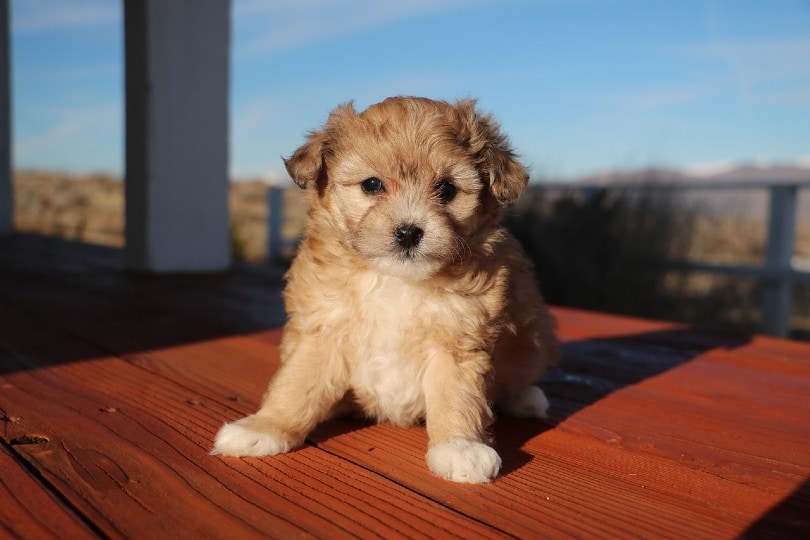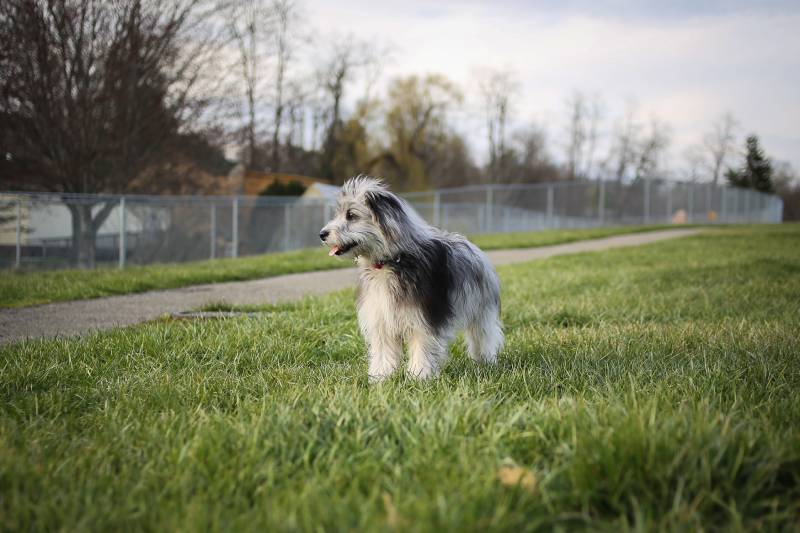
Click Below to Skip Ahead
The Aussiedoodle is a medium-sized, mixed-breed designer dog that combines the Poodle with the Australian Shepherd. Not only are Aussiedoodles very cute and fluffy dogs, but they are also known for their intelligence and trainability.
Breed Overview
Height:
14–23 inches
Weight:
25–70 pounds
Lifespan:
10–12 years
Colors:
Black and red, blue merle, black and tan, red merle, sable
Suitable for:
Those with dog allergies, those looking for a low-shedding dog, active families
Temperament:
Loving, energetic, easy to train
This breed is fairly new, and because it is a designer breed, it is not registered with the American Kennel Club. If you are interested in learning more about the Aussiedoodle breed, keep reading this guide.
Aussiedoodle Characteristics

Aussiedoodle Puppies

When you welcome an Aussiedoodle into your home, you can expect to have a loving and energetic dog around. Aussiedoodles are medium dogs that are great for people with allergies. They’re also very intelligent, making them highly trainable. Aussiedoodles are generally healthy as long as they are fed correctly and have enough exercise.
As you can see, this breed ranks high in almost every category. In this article, we will break down each ranking to give you a comprehensive idea of what it’s like to own an Aussiedoodle.

Temperament & Intelligence of the Aussiedoodle
The Aussiedoodle’s parents, the Poodle and the Australian Shepherd, are very intelligent animals, so it comes as no surprise that the Aussiedoodle is equally intelligent, if not more so. They are also very affectionate and loving with their owners, enjoy human interaction, and require lots of attention. As such, they will not do well outdoors or in kennels. If you’re looking for an independent dog, you may want to reconsider getting an Aussiedoodle. However, if you want a highly intelligent dog that will adore you and your family, this could be the dog for you.
Are These Dogs Good for Families? 👪
Aussiedoodles make wonderful family pets. They are extremely loving and high-energy dogs who will be perfect play companions for your children. However, as with any breed of dog, you should take care to teach your children how to be safe when playing with your Aussiedoodle. Because they are so energetic, it is possible that a wound-up Aussiedoodle could accidentally harm young children if they aren’t closely supervised.
Does This Breed Get Along With Other Pets?
As long as he is introduced to your other pets early on, your Aussiedoodle will get along with your other dogs, and maybe even your cats, without any issue. Be mindful that without this socialization, your Aussiedoodle may try to herd any smaller animals you have due to his Australian Shepherd ancestry.


Things to Know When Owning an Aussiedoodle:
Food & Diet Requirements 🦴
When deciding what to feed your Aussiedoodle, you should make sure to purchase dog food that is formulated for high-energy small to medium dogs. You should look at the labels to ensure you are providing your dog with the highest quality diet that you can reasonably afford. Just like with human food, higher quality dog food tends to contain whole, simple ingredients. If a brand of kibble contains a lot of ingredients you don’t recognize or can’t pronounce, that is likely a sign that you should look for another brand.
The amount of food you give your Aussiedoodle depends on its size. Smaller Aussiedoodles with miniature Poodle ancestry will need less food than a standard Aussiedoodle. In order to calculate your dog’s caloric needs, you can use this standard formula: 30 x your dog’s weight in pounds divided by 2.2 + 70 = your dog’s caloric needs. Using this formula, a dog weighing about 50 pounds would need about 750 calories per day. If possible, avoid leaving food out all day and limit treats because Aussiedoodles are prone to overeating.
Exercise 🎾
We gave this breed 5 out of 5 stars for energy, and for good reason. Aussiedoodles are high-energy dogs that need a lot of exercise. You should plan to dedicate at least an hour each day to walking or jogging with your dog to ensure that he gets the exercise he needs.
In addition to physical exercise, your Aussiedoodle needs lots of mental stimulation. Aussiedoodles are very intelligent dogs and will become bored if they don’t have anything to challenge or stimulate them mentally. If you don’t feel that you can dedicate your time to adequately exercising and stimulating your dog, the Aussiedoodle may not be the breed for you.

Training 🎾
Aussiedoodles are very easy to train due to their intelligence and their desire to please their owners. The best way to train your Aussiedoodle is to reward them for positive behaviors; they do not respond well to anger and harsh techniques.
You should also keep in mind your words and actions and understand that you might be unintentionally teaching your dog lessons you don’t want them to learn. For example, if you get frustrated and take your frustration out on your dog, he will learn that he can’t trust you. If you remain calm and assertive when training your Aussiedoodle, he will learn quickly and eagerly do what you want him to do.
Grooming ✂️
Your Aussiedoodle’s coat will vary depending on the dog. Some Aussiedoodles have wavy coats while some have curly coats. Generally speaking, a dog whose coat has a wavy texture only needs to be combed one to two times per week. However, if your dog’s fur turns out to be very curly like his Poodle ancestors, you should be prepared to groom more frequently.
- See Also: 11 Best Dog Wipes: Reviews & Top Picks
Health and Conditions 🏥
Aussiedoodles are generally healthy dogs. In fact, many mixed-breed dogs tend to be healthier than their purebred counterparts. However, the Aussiedoodle did inherit some health risk factors from its parent breeds. Like any dog, they are prone to certain health conditions that you should be aware of.

Male vs Female
Ultimately, both male and female Aussiedoodles make wonderful companions. There are not very many differences between males and females, and any differences that can be made are generalizations. At the end of the day, each dog is an individual with individual personality traits.
However, there are a few anecdotal differences to note if you aren’t sure whether you want to get a male or female Aussiedoodle. The first difference comes down to size. As with most breeds, male Aussiedoodles tend to be larger than their female counterparts. You may have noticed that there is quite a range in how much this breed weighs on average. The biggest differences in size will come down to a dog’s lineage—as in, whether their parent Poodle was a Standard Poodle or a Miniature Poodle—rather than its sex.
Anecdotally, male Aussiedoodles tend to be more affectionate than their female counterparts. However, if you get your pet spayed or neutered, the actual differences in behavior between male and female Aussiedoodles are negligible.
3 Little-Known Facts About the Aussiedoodle
1. The Aussiedoodle May LOVE Swimming
Its ancestors are the Australian Shepherd and the Poodle, both breeds that seem to take to water quite easily. An Aussiedoodle may really enjoy paddling in a stream or shallow river bed (provided the area is safe for dogs, of course!).
2. There Is Also a Miniature Version of This Breed
Poodles vary in size, and since Aussiedoodles have poodles in their genealogy, they also come in different sizes. The Miniature Aussiedoodle is a smaller version of the Aussiedoodle, having inherited its size from its parent breed, the Miniature Poodle.
3. Aussiedoodles Go By Many Names
You may have heard of the Aussiepoodle or the Aussiepoo in addition to the Aussiedoodle. All of these names refer to the same breed of dog.

Summary
Overall, Aussiedoodles make wonderful family pets due to their high level of intelligence, trainability, and affectionate demeanor. If you are looking for a dog that gets along well with children and even other dogs, the Aussiedoodle could be a great choice. However, if you and your family are not very active or if you have a busy schedule, the Aussiedoodle may not be a great fit for you. These dogs require lots of activity and mental stimulation as well as constant attention. They are not the type of dog that you can leave alone in a kennel all day. If you think you can provide your dog with plenty of stimulation and attention, an Aussiedoodle might be the perfect dog for you.
See Also:
- Aussiedoodle vs Labradoodle Dog Breed: Differences Explained
- Aussie Dalmatian Mix: Pictures, Guide, Info, & Care
Featured Image Credit: Steve Bruckmann, Shutterstock






